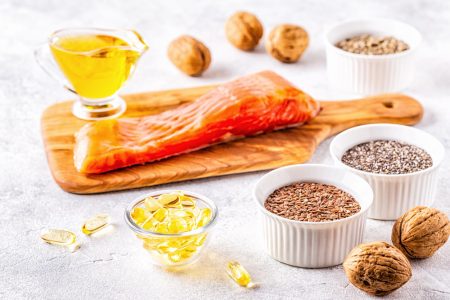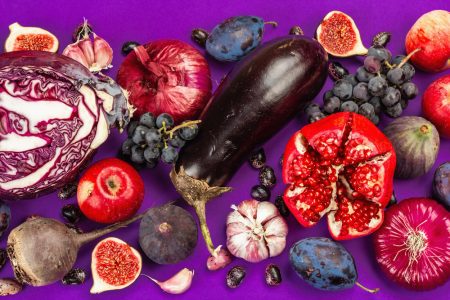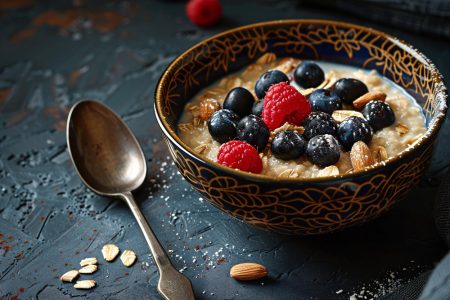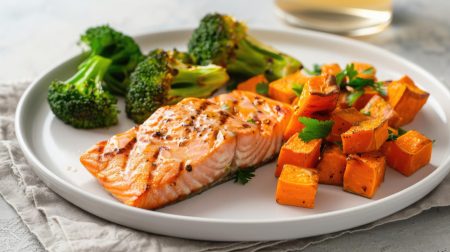Introduction: Why Heart Health Matters for Seniors
As we age, taking steps to prioritize heart health becomes increasingly essential. For seniors, maintaining a healthy heart can make a world of difference in their quality of life, longevity, and energy levels. The heart works harder over time, and years of dietary habits, lifestyle choices, and even genetics begin to influence its function. This can lead to common health concerns like high blood pressure, elevated cholesterol levels, and an increased risk of heart disease—conditions that can significantly impact day-to-day activities and overall well-being. Thankfully, dietary choices are one of the most effective ways to support heart health, and making small, intentional changes can lead to big improvements.
Nutrition plays a crucial role in heart health, especially as the body becomes more sensitive to the effects of certain foods and nutrients. Foods rich in fiber, omega-3 fatty acids, antioxidants, and essential minerals like potassium and magnesium can help reduce inflammation, regulate blood pressure, and support healthy cholesterol levels. By focusing on nutrient-dense foods and mindful portion control, seniors can create a balanced diet that strengthens the heart while providing energy and vitality.
In this guide, we’ll explore specific nutritional tips that are easy to incorporate into everyday meals. From heart-healthy breakfast options to practical grocery shopping tips, these insights are designed to empower seniors to take control of their heart health. Small dietary changes can indeed lead to a stronger, healthier heart, allowing for an active and fulfilling life at any age.
Affiliate Disclaimer
This blog post may include links to affiliate sites. If you click on an affiliate link and make a purchase, we may earn a small commission or receive other compensation at no extra cost to you. Please note that many of the links on our site are affiliate links. Our use of these links does not impact the products, services, or websites we recommend to you. This disclaimer covers all forms of communication with you, including our website, email, phone, social media, products, and other platforms.
Amazon Affiliate Disclaimer
We participate in the Amazon Services LLC Associates Program, an affiliate marketing program that allows us to earn fees by linking to Amazon.com and its affiliated sites. If you click on an Amazon affiliate link on our site and make a purchase, we may receive a small commission at no additional cost to you.
Section 1: Understanding Heart-Healthy Nutrients
For seniors aiming to support heart health through nutrition, knowing which nutrients play key roles is essential. Certain nutrients can protect the heart by reducing inflammation, improving circulation, lowering cholesterol, and maintaining blood pressure. In this section, we’ll look at four main nutrient groups—omega-3 fatty acids, fiber, antioxidants, and essential minerals—that have been shown to directly benefit heart health.
Omega-3 Fatty Acids
Omega-3 fatty acids are known for their anti-inflammatory properties, which can help reduce the risk of heart disease by minimizing inflammation within blood vessels. These fats can also help lower triglyceride levels, a type of fat in the blood that, when elevated, can lead to blockages in arteries. Omega-3s have also been shown to improve blood flow, supporting circulation and helping to regulate heartbeat.

Food Sources: Seniors can find omega-3 fatty acids in fatty fish such as salmon, mackerel, and sardines. For plant-based sources, walnuts, chia seeds, and flaxseeds are excellent options. Including a few servings of omega-3-rich foods, each week is a simple yet impactful way to promote heart health.
Fiber
Dietary fiber is a heart health powerhouse. It helps manage cholesterol levels by binding to cholesterol in the digestive tract, preventing its absorption into the bloodstream. Fiber can also help stabilize blood sugar levels and maintain a healthy weight, both of which are important for seniors as they reduce strain on the heart.
Food Sources: Whole grains (like oats, barley, and brown rice), fruits, vegetables, and legumes are rich in fiber. Starting the day with oatmeal or adding beans to a salad can help seniors reach their fiber needs. The recommended daily fiber intake is about 25-30 grams, though this can vary based on individual health needs. A high-fiber diet promotes digestive health and, in turn, supports a healthy heart.
Antioxidants
Antioxidants help combat oxidative stress, a process where free radicals damage cells in the body. This cell damage is associated with many health issues, including heart disease. Antioxidants neutralize these free radicals, reducing oxidative stress and helping to protect blood vessels and heart tissues from premature aging. This nutrient group is especially important for seniors, as it can help slow down age-related cellular damage and support long-term heart health.
Food Sources: Berries, dark leafy greens, nuts, and dark chocolate are all rich in antioxidants. Including a variety of colorful fruits and vegetables on the plate ensures a range of antioxidants in the diet. Berries, in particular, are high in a type of antioxidant known as polyphenols, which are especially beneficial for the heart.
Potassium and Magnesium
These two minerals play a crucial role in maintaining healthy blood pressure, which is essential for heart health. Potassium helps balance sodium levels in the body, preventing high blood pressure, while magnesium relaxes blood vessels, improving blood flow and circulation. A diet rich in potassium and magnesium can help seniors keep blood pressure under control and reduce their risk of heart disease.
Food Sources: Bananas, oranges, potatoes, and leafy greens are excellent sources of potassium. For magnesium, foods like nuts, seeds, whole grains, and leafy vegetables are ideal. Seniors should aim to incorporate these foods regularly, as both minerals are vital for reducing stress on the heart.
In summary, adding these heart-healthy nutrients—omega-3 fatty acids, fiber, antioxidants, potassium, and magnesium—into the diet can have a meaningful impact on heart health for seniors. A balanced approach, focusing on nutrient-dense foods, will not only improve cardiovascular health but also support overall vitality.
Section 2: Building a Heart-Healthy Plate for Seniors
Creating a balanced, heart-healthy plate can be simple and enjoyable, especially when focusing on nutrient-rich foods that offer variety and flavor. For seniors, building a meal that promotes heart health means incorporating a mix of essential macronutrients, colorful fruits and vegetables, and portion control. This section breaks down these components to help seniors design meals that support heart health with ease and satisfaction.
Balance of Macronutrients
A balanced intake of macronutrients—carbohydrates, proteins, and fats—lays the foundation for heart health. For carbohydrates, it's essential to choose complex carbs, which are high in fiber and release energy slowly, helping to regulate blood sugar levels. Whole grains like oats, quinoa, and brown rice are excellent choices, providing a steady energy source that supports heart health by preventing blood sugar spikes.
When it comes to protein, lean options are best. Fish, especially fatty varieties like salmon, provide heart-healthy omega-3 fatty acids. Plant-based proteins like beans, lentils, and tofu are also fantastic options, as they are low in saturated fat and high in fiber. Healthy fats, like those found in nuts, seeds, and olive oil, contribute to heart health by lowering bad cholesterol (LDL) and raising good cholesterol (HDL). These fats can also help with inflammation, further supporting cardiovascular health.
Emphasis on Portion Control
Portion control is especially important for seniors, as metabolism naturally slows with age, and overeating can lead to weight gain and increased stress on the heart. By following portion guidelines, seniors can enjoy satisfying meals without excessive calories. A general rule of thumb is to fill half the plate with vegetables, one quarter with lean protein, and one quarter with whole grains or other complex carbohydrates. Practicing portion control is a practical approach to supporting heart health, as it prevents overconsumption of calories, salt, and unhealthy fats.

Colorful Fruits and Vegetables
A variety of colorful fruits and vegetables is not only visually appealing but also rich in vitamins, minerals, and antioxidants that are essential for heart health. Dark leafy greens like spinach and kale provide fiber, potassium, and magnesium, which support blood pressure and cholesterol levels. Bright-colored vegetables like carrots, bell peppers, and tomatoes are high in antioxidants that reduce inflammation and protect heart cells from damage.
For fruits, options like berries, apples, and oranges provide fiber and antioxidants, while bananas are particularly high in potassium, which helps regulate blood pressure. By including a rainbow of fruits and vegetables on the plate, seniors can naturally support heart health while also enjoying diverse flavors and textures in their meals.
Low-Sodium Choices
Reducing sodium intake is one of the most important dietary steps for heart health, as too much sodium can lead to high blood pressure, a major risk factor for heart disease. Seniors should aim to cook more at home, using fresh ingredients and herbs instead of salt to flavor meals. Processed and packaged foods, such as canned soups, deli meats, and frozen dinners, are often high in sodium and should be limited.
When grocery shopping, choosing low-sodium or sodium-free versions of foods can make a big difference. Additionally, checking food labels for sodium content can help seniors make informed choices that support heart health. Aiming for no more than 1,500 milligrams of sodium per day can help maintain healthy blood pressure and reduce strain on the heart.
By focusing on balanced macronutrients, portion control, colorful produce, and low-sodium options, seniors can create meals that support heart health at every bite. Building a heart-healthy plate doesn’t have to be restrictive; instead, it’s about choosing nutrient-dense foods that provide energy, flavor, and essential heart benefits. This approach can help seniors enjoy meals that nourish both the body and the heart, supporting long-term cardiovascular health.
Section 3: Heart-Healthy Meal Ideas for Seniors
Incorporating heart-healthy foods into daily meals can be simple and enjoyable with a little planning. Seniors can benefit from meals that are rich in nutrients, easy to prepare, and tailored to promote heart health. Here, we’ll explore meal ideas for breakfast, lunch, dinner, and snacks that support heart health by including fiber, healthy fats, lean proteins, and antioxidant-rich ingredients.
Breakfast
Starting the day with a heart-healthy breakfast can set the tone for steady energy and balanced nutrition. A fiber-rich breakfast helps with cholesterol management and promotes satiety, making it a great choice for seniors.

Example Meal: Oatmeal topped with berries and walnuts. Oatmeal is an excellent source of soluble fiber, which has been shown to reduce cholesterol levels. Berries like blueberries or strawberries add antioxidants, which combat oxidative stress, while walnuts provide omega-3 fatty acids, supporting heart health through their anti-inflammatory effects. For extra flavor, sprinkle a little cinnamon, which may help manage blood sugar levels.
Other Ideas: Greek yogurt with a handful of almonds and sliced bananas or whole-grain toast with avocado and a sprinkle of flaxseeds for added omega-3s. These breakfasts are quick to prepare and packed with nutrients that promote heart health.
Lunch
A balanced lunch for seniors should include a variety of vegetables, lean proteins, and whole grains. This combination not only provides essential nutrients for heart health but also supports blood sugar regulation and sustained energy.
Example Meal: Quinoa salad with leafy greens, chickpeas, bell peppers, and a sprinkle of pumpkin seeds. Quinoa is a whole grain that offers fiber and protein, while leafy greens like spinach or kale are rich in magnesium and potassium, which help control blood pressure. Chickpeas add plant-based protein, and bell peppers provide vitamin C and antioxidants. Pumpkin seeds offer a boost of healthy fats, promoting heart health through their high magnesium content.
Other Ideas: A turkey and avocado sandwich on whole-grain bread with a side of mixed greens or a lentil and vegetable soup with a slice of whole-grain bread. These lunches are nutrient-dense and easy to prepare, helping seniors maintain heart health while enjoying variety.
Dinner
Dinner can be a hearty, satisfying meal that provides lean protein, complex carbohydrates, and plenty of vegetables. For seniors, keeping dinner light but nutrient-dense supports good digestion and prevents late-night indigestion.
Example Meal: Grilled salmon, sweet potatoes, and steamed broccoli. Salmon is rich in omega-3 fatty acids, which promote heart health by reducing inflammation and supporting healthy cholesterol levels. Sweet potatoes are a complex carbohydrate with fiber and potassium, which aid in blood pressure control, while broccoli provides antioxidants that protect heart cells.

Other Ideas: Baked chicken breast with roasted vegetables like carrots and Brussels sprouts or a stir-fry with tofu, bell peppers, and snap peas over brown rice. These dinners offer a satisfying end to the day with plenty of nutrients to support heart health.
Snacks
Choosing heart-healthy snacks throughout the day can prevent overeating at mealtimes and provide an extra dose of beneficial nutrients. Seniors can enjoy snacks that are high in fiber, antioxidants, and healthy fats to support heart health between meals.
Example Snack: Apple slices with almond butter. Apples provide fiber and antioxidants, while almond butter offers healthy fats that support cardiovascular health.
Other Ideas: A handful of unsalted nuts like almonds or walnuts, low-fat yogurt with a sprinkle of chia seeds, or a small bowl of berries. These snacks are easy to prepare and deliver nutrients that directly benefit heart health.
By incorporating these meal and snack ideas, seniors can enjoy a variety of flavors while nourishing their bodies with heart-healthy foods. Each meal provides an opportunity to support heart health through simple, nutrient-dense ingredients, making it easier to maintain a balanced and heart-focused diet. These meal options are not only delicious but also specifically designed to promote cardiovascular health, giving seniors the tools to eat well and stay strong.
Section 4: Hydration and Heart Health
Staying hydrated is essential for overall health, but it plays a particularly important role in heart health. For seniors, proper hydration supports the heart by helping it pump blood more easily, reducing strain on the cardiovascular system. Since hydration needs change with age, it’s essential for seniors to understand how staying hydrated can boost heart health and to adopt strategies for adequate fluid intake.
Importance of Hydration for Heart Health
The heart, being a muscular organ, relies on an adequate amount of fluids to function efficiently. When properly hydrated, blood remains fluid and flows easily, helping the heart circulate oxygen and nutrients throughout the body without excess effort. Dehydration, on the other hand, causes blood to thicken, forcing the heart to work harder to pump it, which can lead to elevated blood pressure and increased strain on the cardiovascular system. For seniors who may already experience age-related changes in heart function, staying well-hydrated is key to supporting heart health and preventing unnecessary cardiovascular stress.
Proper hydration also aids in digestion and kidney function, both of which contribute to heart health by ensuring that nutrients are absorbed effectively and waste is excreted efficiently. With enough fluids in the body, blood pressure regulation is improved, and electrolyte balance is maintained, further reducing the risk of heart-related complications.

Tips for Staying Hydrated
As people age, the sense of thirst often decreases, meaning seniors may not always recognize when they need to drink water. To stay hydrated and support heart health, seniors can adopt practical strategies that make it easier to meet daily fluid needs. Aiming for around eight glasses (or approximately two liters) of water daily is a good general goal, but individual requirements may vary based on activity level, climate, and overall health.
1. Set a Hydration Schedule: Some seniors find it helpful to set specific times throughout the day to drink a glass of water, such as first thing in the morning, mid-morning, with meals, and before bed. A routine can ensure consistent hydration without the need to rely on thirst cues.
2. Use Visual Reminders: Having a water bottle in plain sight or using a water-tracking app can remind seniors to drink regularly. Choosing a water bottle with measurements on the side can also make it easier to track daily intake and meet hydration goals for heart health.
Heart-Healthy Beverage Options
While plain water is the best choice for hydration, a variety of heart-healthy beverages can also be enjoyed to meet daily fluid needs. For seniors who prefer more flavor or find it challenging to drink enough water, these options can be appealing and still promote heart health.
1. Herbal Teas: Herbal teas, such as chamomile, mint, or ginger, are flavorful and free of caffeine, making them gentle on the body. Many herbal teas also contain antioxidants that benefit heart health by reducing oxidative stress.
2. Infused Water: Adding slices of fruits like lemon, cucumber, or berries to water can provide natural flavor without added sugars. These fruits also add vitamins and antioxidants that support heart health while making hydration more enjoyable.
3. Low-Sodium Broth: Warm broths, especially those low in sodium, are hydrating and can be a comforting choice, especially in cooler months. A cup of vegetable or bone broth can add variety to a hydration routine without impacting heart health negatively.
What to Limit: Sugary and Caffeinated Beverages
It’s essential for seniors to be mindful of beverages that can undermine heart health. Sugary drinks, such as soda and sweetened juices, should be minimized, as high sugar intake can lead to weight gain, high blood pressure, and elevated cholesterol. Similarly, caffeinated drinks like coffee and black tea can have a diuretic effect if consumed in large amounts, leading to dehydration. For those who enjoy caffeine, moderation is key, and pairing caffeinated beverages with water can help offset any dehydrating effects.
Proper hydration supports heart health by enabling the cardiovascular system to work efficiently and reducing the risk of complications like high blood pressure. By following these simple tips and focusing on heart-healthy beverage choices, seniors can stay hydrated, promote circulation, and ultimately enjoy better cardiovascular health.
Section 5: Foods to Limit for Optimal Heart Health
While adding heart-healthy foods is essential, equally important is knowing which foods to limit or avoid. Certain foods can negatively impact heart health by raising cholesterol, blood pressure, and inflammation levels. For seniors, being mindful of these choices is especially crucial, as small changes can significantly benefit long-term cardiovascular health. This section outlines the main food groups to minimize, including saturated and trans fats, added sugars, and high-sodium processed foods.
Saturated and Trans Fats
Fats are an essential part of a balanced diet, but not all fats are beneficial for heart health. Saturated and trans fats, in particular, can increase LDL (bad) cholesterol levels and contribute to the formation of plaque in the arteries, raising the risk of heart disease and stroke. Saturated fats are commonly found in animal products like red meat, butter, and full-fat dairy, as well as in processed foods. Trans fats, though now limited in many countries, can still be found in some margarine, shortening, and packaged baked goods.
Tips for Reducing Saturated and Trans Fats:
- Choose Lean Proteins: Opt for lean meats like chicken, turkey, and fish instead of fatty cuts of beef and pork. Incorporating more plant-based proteins, such as beans, lentils, and tofu, can further reduce saturated fat intake.
- Use Healthier Oils: Swap butter and shortening for heart-healthy oils like olive oil or avocado oil. These oils contain monounsaturated and polyunsaturated fats, which support heart health by lowering bad cholesterol.
- Read Labels: Check food labels for “partially hydrogenated oils,” which indicate the presence of trans fats, and avoid products that contain them.
Added Sugars
Excessive sugar intake can lead to weight gain, insulin resistance, and elevated blood pressure, all of which increase the risk of heart disease. Added sugars are often hidden in processed foods and beverages, making it easy to exceed recommended daily limits without realizing it. For seniors, reducing added sugars can help support heart health and maintain stable energy levels.
Common Sources of Added Sugars:
- Sugary Drinks: Beverages like soda, sweetened coffee, and energy drinks are major sources of added sugars. Instead, opt for water, herbal teas, or unsweetened alternatives.
- Processed Snacks: Packaged cookies, cakes, and candies often contain high amounts of sugar. For a heart-healthy alternative, try fresh fruits, which offer natural sweetness along with fiber and antioxidants.
- Condiments and Sauces: Ketchup, barbecue sauce, and salad dressings can contain added sugars. Choosing homemade or low-sugar versions can help reduce sugar intake.
High-Sodium Processed Foods
Sodium is an essential mineral, but consuming too much can lead to high blood pressure, putting extra strain on the heart and increasing the risk of heart disease. Many processed foods, canned goods, and restaurant meals contain high levels of sodium. Seniors should aim to limit sodium intake to no more than 1,500-2,000 mg per day to support heart health.
Tips for Reducing Sodium Intake:
- Opt for Fresh Ingredients: Cooking at home with fresh ingredients allows for better control over salt content. Herbs, spices, and lemon juice can add flavor without the need for extra salt.
- Choose Low-Sodium Options: When buying canned vegetables, soups, or other packaged foods, look for “low-sodium” or “no salt added” versions.
- Be Cautious with Restaurant Foods: Restaurant meals are often high in sodium. When dining out, seniors can request that their food be prepared with less salt or ask for sauces and dressings on the side.
By limiting saturated and trans fats, added sugars, and sodium, seniors can make meaningful strides toward better heart health. These adjustments don’t have to be restrictive but rather encourage choosing wholesome, nutrient-dense foods that support the heart. Together with heart-healthy additions, these mindful changes create a balanced approach that promotes cardiovascular health and reduces the risk of heart disease.
Section 6: Practical Tips for Making Heart-Healthy Choices
Making heart-healthy food choices doesn’t have to be overwhelming or complicated. With a few practical strategies, seniors can make nutritious choices that support heart health and fit easily into daily routines. From smart grocery shopping to dining out tips and meal preparation ideas, this section offers practical advice for creating a heart-friendly lifestyle.
Grocery Shopping Tips
A heart-healthy lifestyle starts at the grocery store. The foods you bring into your home set the foundation for your meals, so making thoughtful choices while shopping can have a big impact on heart health. Here are a few strategies to consider:
- Shop the Perimeter: Whole foods, like fruits, vegetables, lean proteins, and whole grains, are typically located along the perimeter of the store. Focusing on these areas can help you avoid highly processed foods that are often high in unhealthy fats, added sugars, and sodium.
- Read Labels Carefully: When buying packaged items, check the nutrition labels. Look for foods low in saturated fats, trans fats, sodium, and added sugars and high in fiber. For heart health, aim to choose items with less than 5% daily value of saturated fat and sodium.
- Choose Whole Grains: Whole grains, such as oatmeal, quinoa, and whole-grain bread, provide fiber that supports heart health by helping to lower cholesterol. Look for labels that list “100% whole grain” or “whole wheat” as the first ingredient.
Dining Out Suggestions
Eating out can be enjoyable and convenient, but restaurant meals are often higher in calories, unhealthy fats, and sodium. However, with a few mindful choices, seniors can maintain their heart health while dining out.
- Ask for Modifications: Don’t be afraid to request modifications to make a dish more heart-friendly. For example, ask for dressings and sauces on the side, and request grilled or baked options instead of fried.
- Watch Portion Sizes: Restaurant portions are typically larger than what’s needed for a single meal. Consider sharing an entrée with a friend or boxing up half for later. This approach not only helps with portion control but also prevents overeating.
- Choose Lean Proteins and Vegetables: When selecting an entrée, opt for lean proteins like grilled chicken, fish, or plant-based proteins. Pair them with steamed or sautéed vegetables to keep the meal light and heart-healthy.
Meal Preparation Ideas
Preparing meals at home is one of the best ways to ensure heart-healthy eating, as it gives you full control over ingredients and preparation methods. Batch cooking and meal planning can make it easy to incorporate heart-healthy foods into your weekly routine.
- Plan Ahead: Creating a weekly meal plan can help you avoid last-minute decisions that lead to less healthy choices. By planning heart-healthy meals in advance, you can make sure your kitchen is stocked with wholesome ingredients.
- Batch Cook for Convenience: Cooking in large batches can save time and make heart-healthy meals readily available. For instance, prepare a large pot of vegetable soup, whole grains like quinoa, or baked chicken that can be used in multiple meals throughout the week.
- Use Heart-Healthy Cooking Methods: Choose cooking methods that require little or no added fat, such as grilling, steaming, baking, and sautéing with a small amount of olive oil. These methods help reduce unnecessary saturated fats, making each meal supportive of heart health.
Keeping Heart-Healthy Snacks on Hand
Having heart-healthy snacks on hand can prevent hunger between meals and provide an extra boost of beneficial nutrients. Stocking up on simple, nutrient-dense snacks can make it easier to resist less healthy options.
- Snack Ideas: Keep a bowl of fresh fruits like apples and oranges available for a quick, fiber-rich snack. Nuts, seeds, and yogurt are also great choices, as they provide healthy fats, protein, and calcium that support heart health.
- Avoid Processed Snacks: Limit packaged snacks like chips, cookies, and sugary bars, as they often contain high levels of sodium, sugar, and unhealthy fats. By choosing whole-food snacks, seniors can maintain energy levels and avoid unnecessary calories that could impact heart health.
Incorporating these practical tips into daily life can help seniors make heart-healthy choices with ease and consistency. By planning meals, making smart choices when eating out, and having nutritious snacks on hand, seniors can create a lifestyle that supports heart health without feeling restrictive. Each small choice contributes to a larger impact, leading to stronger cardiovascular health and a greater sense of well-being.
Conclusion: Small Changes for Lifelong Heart Health
Heart health is a cornerstone of overall well-being, especially for seniors aiming to live vibrant, active lives. By focusing on nutritious foods, smart portions, and balanced hydration, seniors can make daily choices that support cardiovascular strength and resilience. The journey toward heart health doesn’t require drastic changes; rather, it’s about making small, consistent adjustments to meals and lifestyle. From adding fiber-rich grains and colorful vegetables to choosing lean proteins and healthy fats, each choice made with heart health in mind contributes to a stronger and more efficient cardiovascular system.
Alongside nutrition, habits like regular hydration and reading food labels can go a long way in maintaining blood pressure and cholesterol levels within a healthy range. These actions can become routine over time, empowering seniors to take control of their health and enjoy meals that are both satisfying and heart-friendly.
Additionally, making heart health a priority can offer lasting rewards, such as increased energy, improved mobility, and greater independence. The heart, after all, is an organ that deserves care and attention at every stage of life. As seniors implement these strategies, they not only reduce the risk of heart disease but also cultivate a lifestyle that supports longevity and vitality. Embracing heart-healthy choices daily can help seniors live life to the fullest, supported by a strong and healthy heart.


